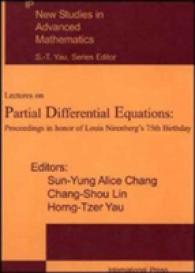Description
(Text)
Narrative plays a central role for individual and collective lives - this insight has arguably only grown at a time of multiple social and cultural challenges in the 21st century. The present volume aims to actualize and further substantiate the case for literature and narrative, taking inspiration from Vera Nünning's eminent scholarship over the past decades. Engaging with her formative interdisciplinary work, the volume seeks to explore potentials of change through the transformative power of literature and narrative - to be harnessed by individuals and groups as agents of positive change in today's world. The book is located at the intersection of cognitive and cultural narratology and is concerned with the way literature affects individuals, how it works at an intersubjective level, enabling communication and community, and how it furthers social and cultural change.
(Short description)
Narrative plays a central role for individual and collective lives - this insight has arguably only grown at a time of multiple social and cultural challenges in the 21st century. The present volume aims to further substantiate the case for literature and narrative, taking inspiration from Vera Nünning's eminent work over the past decades. Located at the intersection of cognitive and cultural narratology, the book is concerned with the way literature affects individuals, how it works at an intersubjective level, enabling communication and community, and how it furthers social and cultural change.
(Table of content)
Introduction (Corinna Assmann, Jan Rupp, Christine Schwanecke)
I. Literature Affecting Lives at an Individual Level
Haiku and Healing. Lessons from the Pandemic Classroom for Literature and Narrative in Life (Jan Rupp)
'Not form which you see, but emotion which you feel'. Crisis, Time, and Hyperempathy in Octavia Butler's Earthseed Novels (Stefanie Schäfer)
Narrating the Pandemic. Daniel Defoe's A Journal of the Plague Year (1722) as Salutogenesis (Christine Schwanecke)
Can Literature Heal? Therapeutic Dimensions of Writing and Narrative (Cristian Camilo Cuervo)
II. Literature and Positive Change at an Intersubjective Level
Reflections of 'Togetherness' and a Co-Narrating Community in Fictional 'We'-Narratives. A Case Study of the Japanese 'Picture Brides' in Julie Otsuka's The Buddha in the Attic (2011) (Dorina-Daniela Vasiloiu)
Reading Unreliable Narration. Enhancing our Empathy, Understanding, and Self-Examination (Max Cannings)
Promoting Empathy in 'Generation Me'. The Didactic Potential of Unreliable Narratives Featuring Narrators with a Mental Illness in the EFL Classroom (Sebastian Beckmann)
Renouncers, Rumours, and 'Beyond-the-Pales'. Nikolai Gogol and the Subversive Power of Narrative(s) in Anna Burns' Milkman (2018) (Caroline Lusin)
III. Narratives Promoting Social and Cultural Change
Positive Change in Crime Fiction. Genre Renewal and the Politics of Gender, Race, and Sexuality in Cheryl A. Head's Bury Me When I'm Dead (2016) (Alexander Schindler)
Maps and Narrative. Mobilizing and Connecting Perspectives in a Space of Encounter (Corinna Assmann)
'United in Positive Intention'. Self-Transcendence Values and the Negotiation of Crises in George Saunders's Lincoln in the Bardo (2017) (Nina Gillé)
Optimism in the Anthropocene. Cultivating Hope in Barbara Kingsolver's Flight Behaviour (2012) (Désirée Link)
(Author portrait)
Corinna Assmann ist Wissenschaftliche Mitarbeiterin am Anglistischen Seminar der Ruprecht-Karls-Universität Heidelberg.
Jan Rupp ist apl. Professor am Anglistischen Seminar Heidelberg und Koordinator des Research Centre for the Study of Culture (RCSC) an der Justus-Liebig-Universität Gießen.
Christine Schwanecke ist Professorin für Englische Literatur- und Kulturwissenschaft an der Karl-Franzens-Universität Graz.








